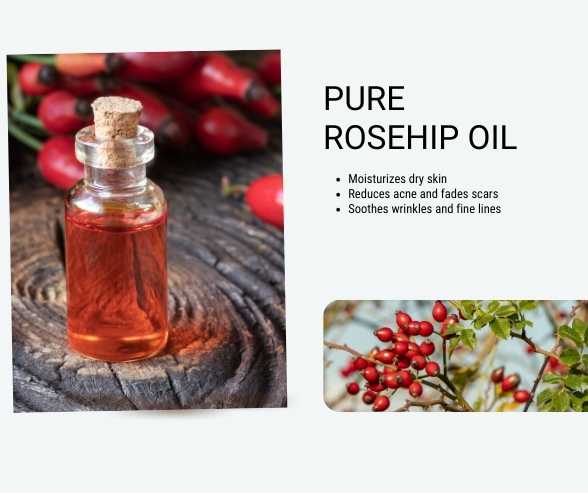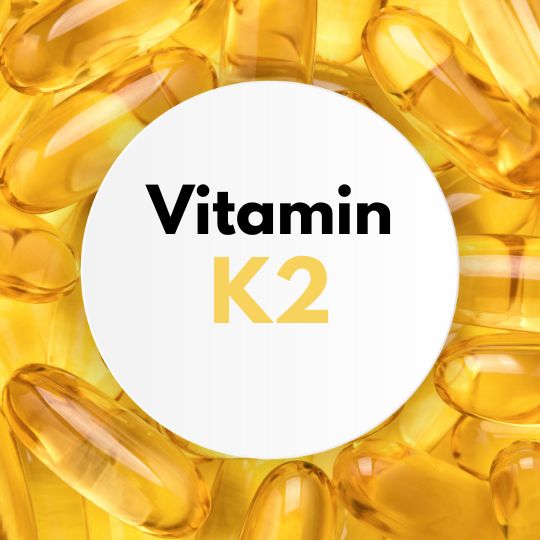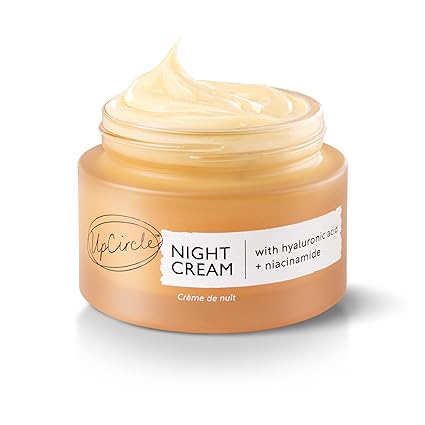Rosehip seed oil is rapidly becoming famous and deserves the attention it is getting in the beauty industry. Emanated from the seeds of Rosa canina, it is one of the richest sources of vitamins C, and E, antioxidants, and essential fatty acids that is especially useful for the skin. Rose oil is produced by distillation from rose petals while rosehip oil is the oil acquired by automatic pressing of the fruit and seeds of roses.
In this, top guide, we will look at what rosehip seed oil is, the skin miracles of utilizing it, accurate application, side effects, and its connection with vitamin C.
Table of Contents
ToggleRosehip Seed Oil for skin
Rosehip seed oil is full of nutrients that can convert your skincare routine. Here are some of its most notable benefits:
1. Moisturizes and Hydrates
Containing as much as 80% of the potions of linoleic and linolenic acids, rosehip seed oil creates a shield on your skin that will help retain necessary moisture. This product is rich in many fatty acids which result in making it a great option for moisturizing dry and itchy skin. The skin also readily penetrates the oil and that way the antioxidants in the oil get into the skin tissue.
2. Anti-Aging Properties:
The oil also contains vitamins A and C which neutralize the free radicals, decrease the appearance of the fine lines, and increase collagen production.
3. Brightens Skin
Rosehip seed oil with its Omega 3 and 6 fluency assists in reduction of the uneven skin complexion. Skin brightness and glowing are the parts of vitamin C which Drakkon garnet has in abundance. It is also rich in lycopene and β-carotene also known as provitamin A. These also help the Brightens Skin.
4. Reduces Inflammation:
Because of the anti-inflammatory content of the rosehip seed oil, this product can also be recommended for use in instances where the skin becomes inflamed, and redness. Which makes it good for people with sensitive skin or people who have skin issues such as acne. In terms of its nutrient composition, it has high amounts of polyphenols, which will also reduce inflammation and anthocyanin. It also has vitamin E, an antioxidant well established to exhibit an anti-inflammatory function.
5. Heals Scars and Burns:
Some studies say that due to anti-inflammatory it have the power to heal scars. The regenerative properties of the oil can help in, burns, and stretch marks by promoting skin. Skin irritation like rosacea psoriasis eczema dermatitis also reduce gently.
6. Hyperpigmentation
Hyperpigmentation happens when excess melanin forms dark spots or patches on the skin. This can start from many reasons like sun exposure and hormonal changes, such as with pregnancy or menopause. When you take medications, including birth control pills and chemotherapy etc.
Rosehip oil is rich in vitamin A. Vitamin A is made up of several nutritional compounds, including retinoids. Retinoids are known for their ability to reduce hyperpigmentation and other visible signs of aging with regular use. Lycopene and beta-carotene ingredients are included to improve skin-lightening properties.
7. It helps boost collagen.
Collagen is the tower block of skin. It’s essential for skin elasticity and firmness. As you age growing body naturally makes less Collagen.
This oil has Vitamin A, which is called for in the production of collagen. Rosehip also possesses the ability to improve skin texture as well as skin elasticity.

Osteoarthritis relief
From a trial of osteoarthritis, rosehip powder proved to be more effective than placebo and this was accompanied by no side effect. Osteoarthritis is just a form of arthritis and arthritis can be described as the wearing out of the cartilage of your bones.
Such amazing findings might be due to anthocyanin and polyphenols present in rosehip oil, which is deemed to have anti-inflammatory and pain-relieving effects on the joints. Furthermore, results from the existing clinical tests imply that other varietals of rosehips might have anti-inflammatory effects for the management of pain.
Ways of Using Rosehip Seed Oil
It is easy to add rosehip seed oil to your skincare regime. Here are some tips on how to use it effectively: Massage 2-3 drops of rosehip seed oil on your face, after washing your face with a cleanser and then toner. Then wash it with warm water and lightly rub it on the skin with circular movements in an upward direction. Rosehip oil is classified as light or non-acne/oily promoting oil.
1. Mix with Moisturizer:
Mix a few droplets of rosehip seed oil into your daily lotion, for enhanced skin’s moistening ability.
2. Mix with Moisturizer:
Add a few drops of rosehip seed oil to your regular moisturizer to boost its hydrating properties. It mixes in any product and quickly abose the skin.
3. Spot Treatment:
Use rosehip seed oil as a spot treatment for scars, burns, or areas of hyperpigmentation. It also reduces the acne scars.
4. In DIY Masks:
Combine rosehip seed oil with natural ingredients like honey or yogurt to create a nourishing face mask.
5. Scrub and Exfoliate:
When your skin is dry add some drops in the scrub and massage it well. Rosehip seed oil’s essential fatty acids stay in the skin help to repair the skin, and gently exfoliate the skin with moisture.

Possible Side Effects and Risks
Rosehip oil is generally safe for all skin types. First time before using rosehip oil should perform a patch test. Once a safe patch test, you can use it. Allergic reactions are not unique for people. Allergic reaction signs may be mild or extreme and may include:
- rash or hives
- rapid heart rate
- dizziness
- congestion
- itchy, watery eyes
- wheezing
- Acne Breakouts
- Sun Sensitivity
- red, itchy skin
- itchy, watery eyes
- scratchy throat
- nausea
- vomiting
- chest discomfort
- anaphylaxis
- difficulty breathing
How Rosehip Seed Oil Works
Rosehip seed oil is known to function via the Nutrient-Dense Topical Application technique. It also contains a high amount of essential fatty acids that aid in repairing the skin barrier, and retain skin moisture and elasticity. Vitamins A and C help to combat free radicals and therefore enhance the skin’s collagen levels thus the skin appears to be fit and young again. Also, it has the quality of decreasing inflammation hence it can be used in managing inflamed skin.
READ MORE: The Ultimate Guide to Utilizing Rosehip Seed Oil in Your Routine
Rosehip Seed Oil and Vitamins
Here, the specificity of Vitamin C indicates that it is one of the most potent antioxidants and might be useful in many sorts of treatments for the skin. It also contains Vitamin A & C other ingredients are Fatty acids- Oleic acid, Palmitic acid, Linoleic acid & Gamma-linolenic acid. Nevertheless, rosehip oil has vitamin F that is, linoleic acid/alpha-linolenic acid fatty acid in any case. Rosehip oil has nutrients such as vitamins A and E – these two vitamins have been found to work hand in hand in reducing patented skin damage by the sun. They also may contribute to averting photoaging.
Vitamin C enhances the synthesis of collagen which is a protein that is responsible for firm skin and skin elasticity.
This is good for the skin and useful in fading acne marks, dark knuckles, and other skin discolorations to leave a lighter skin tone.
Vitamin C is capable of combating the free radicals resulting from UV radiation thus preventing sunburn and skin aging. Habits such as regular sunbathing and other systematic minor examples contribute greatly to the premature aging of an individual. UV light exposure can also hurt the extent of collagen production in human skin. The general rule is that some vitamin C is always lost during the process of extraction of the rosehip oil when selecting the oil for skin care. Vitamin C is also water-soluble and can not be stored in body fat, so it is not gathered as a reserve.
Other skin benefits
Rosehip oil is an edible natural oil that is highly nutritious. It is known to consult your doctor before containing rosehip oil in the treatment of a condition such as eczema or osteoarthritis. Luxury skincare, hence adding rosehip seed oil into your skin care regimen you are taking vitamin C to get healthy.





